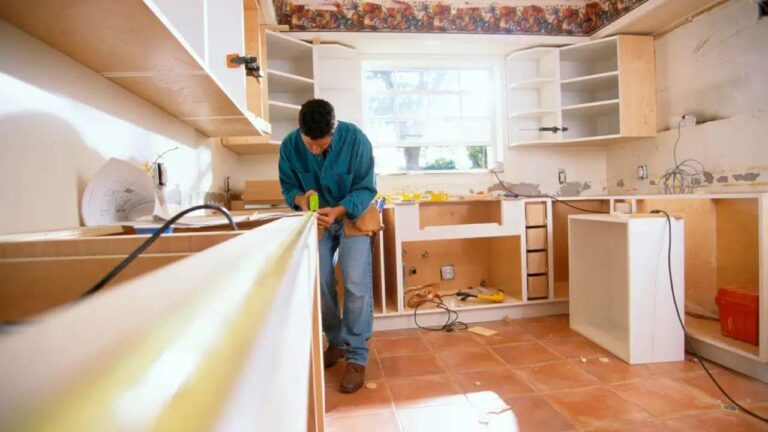So you’re ready to take on a major home renovation? That’s awesome! Whether you’re dreaming of a kitchen that actually works for your family.
A bathroom that feels like a mini spa, or maybe knocking down a wall to create that open concept you’ve always wanted — big renovations can totally transform how you live in your space.
But here’s the truth: jumping into renovations without proper prep is like baking a cake without reading the recipe first.
You might end up with something, but it probably won’t be what you wanted! Good planning makes the difference between a renovation horror story and a success story you’ll brag about to friends.
This guide walks you through everything you need to know before the first hammer swings.
No fancy jargon, no complicated steps — just practical advice to help you get ready for the dust, decisions, and eventual delight of renovating your home.
10 Tips To Prepare Your Home For Major Renovations
Think of renovation prep like packing for a camping trip.
Forget something important and you’ll feel the pain later! These 10 tips cover all the bases — from figuring out what you actually want to do, to making sure you can still brush your teeth when your bathroom’s torn apart.
Each step builds on the one before it, creating a solid foundation for your project.
Speaking of foundations, Many homeowners find it beneficial to work with professionals who specialize in creating stable foundations, such as those who provide services like https://qualityagebuild.com/services/bench-footing/.
Their expertise ensures your renovation starts on solid ground, literally!
Define Your Renovation Goals
What’s actually bugging you about your current space? Is it the lack of natural light? The awkward traffic flow when you have guests over? The kitchen cabinets that don’t quite close right?
Get super clear on your “why” before anything else. Make a list of needs versus wants:
- Need: A second bathroom because morning routines are chaos
- Want: Heated bathroom floors because cold tile is no fun
Talk to everyone in your household about what matters to them too.
Your teenager might have different priorities than your spouse!
Also think about the future.
Will this renovation still make sense in five years? If you’re adding a nursery but plan to move in three years, maybe reconsider the custom built-ins with your kid’s name carved into them.
The clearer your goals, the easier every decision becomes down the road.
Establish a Budget and Timeline
Money talk isn’t always fun, but it’s essential.
Take your initial budget number… and then add 20%. Seriously! Almost every renovation hits unexpected costs.
“But what about those TV shows where they renovate a whole house for $20,000?” Sorry to burst your bubble, but those shows have sponsors providing materials at discount or free, and they don’t show all the costs.
Create a spreadsheet with categories like:
- Labor costs
- Materials
- Permits and fees
- Temporary housing if needed
- New furniture or décor for the finished space
- SURPRISE FUND (this will save your sanity later)
For timeline, start with your contractor’s estimate, then add buffer time. If they say two weeks for a bathroom remodel, mentally prepare for three or four.
Renovations almost never finish early, but they frequently finish late.
Mark important dates on your calendar — when you need to order materials, when demo starts, when inspections happen.
Having a visual timeline helps everyone stay on the same page.
Research and Hire the Right Professionals
Finding good pros makes or breaks your renovation.
Ask friends for recommendations, read reviews, and check credentials.
When interviewing contractors:
- Ask to see previous work similar to yours
- Get at least three quotes (and be suspicious if one is way lower than others)
- Check they’re properly licensed and insured
- Ask how they handle unexpected problems
- Trust your gut feeling about them
Remember that specialists often do better work than generalists.
For example, a kitchen renovation might need a plumber, electrician, cabinet installer, and countertop specialist rather than one person trying to do it all.
If your project involves structural changes, you absolutely need experts who understand how to maintain your home’s integrity.
An architect or structural engineer might seem like an extra expense, but they prevent costly mistakes.
And, yes, don’t forget about the after renovation waste. They are equally important to handle. In such cases as well, hiring a professional such as For larger projects, consider professional solutions, such as dumpster rental in Toronto can be super helpful.
Secure Permits and Approvals
Permit talk makes people yawn, but skipping this step can lead to serious headaches.
Unpermitted work can force you to tear out completed renovations, create insurance problems, and cause issues when you eventually sell.
Check with your local building department about what residential permits you need. Common ones include:
- Building permits for structural changes
- Electrical permits
- Plumbing permits
- Mechanical permits for HVAC work
If you live in an HOA community, you’ll likely need their approval too.
Get everything in writing!
The permit process typically involves submitting plans, paying fees, and scheduling inspections at different project stages.
Your contractor should handle most of this, but stay involved and keep copies of everything.
Prepare Your Living Arrangements
Think about how you’ll live during the chaos.
Can you stay in your home? Should you move out temporarily?
If staying, create a mini-living plan:
- For kitchen renovations: Set up a temporary kitchen with microwave, coffee maker, and mini-fridge in another room
- For bathroom renovations: Arrange shower access at a neighbor’s, gym, or family member’s home
- For bedroom renovations: Relocate sleeping arrangements to other rooms
If the work will be extensive or you have young kids, pets, or family members with health concerns, temporary housing might be worth the cost.
Compare prices of extended-stay hotels, short-term rentals, or staying with family.
Don’t forget to factor dust, noise, and privacy issues into your decision.
A renovation that seems tolerable on paper might feel unbearable by day three of jackhammering.
Protect Your Home and Belongings
Your stuff needs protection from dust and damage during renovation.
Start by clearing the work area completely.
Remove furniture, wall decorations, and anything that could get damaged.
For items that can’t be moved, cover them properly:
- Use plastic sheeting taped at the edges to create dust barriers
- Cover furniture with old sheets or plastic covers
- Remove and safely store valuables, photos, and fragile items
- Consider renting a storage pod for temporary storage
Talk to your contractor about dust control methods.
Professional contractors use special fans, air scrubbers, and sealing techniques to contain dust to work areas.
Take “before” photos of everything, including inside cabinets and closets that will be removed.
These help with insurance claims if damage occurs and give you reference points for putting things back later.
Plan for Utilities and Safety
Renovations often mean temporary utility shutoffs.
Plan ahead for times without water, electricity, or gas.
Make a utility plan:
- Keep flashlights and batteries handy
- Store drinking water if simple plumbing will be affected
- Know where main shutoff valves are for water, gas, and electrical panels
- Discuss with contractors exactly when utilities will be interrupted and for how long
Safety planning is crucial too:
- Keep fire extinguishers accessible
- Maintain clear paths to exits
- Secure temporary wiring so it’s not a tripping hazard
- Lock up tools at the end of each workday if you have kids
- Consider a lockbox for a house key so workers can access the home when needed
Don’t forget about keeping pets friendly, safe and away from construction zones.
The noise, strange people, and open doors can stress them out and create escape opportunities.
Communicate and Manage Expectations
Good communication prevents most renovation problems.
Set up regular check-in times with your contractor to discuss progress and issues.
Create a single point of contact for decisions to avoid confusion.
If both you and your partner give different instructions to workers, chaos follows.
Let neighbors know about your renovation plans before work starts. Tell them:
- Approximate timeline
- Expected noise periods
- When large deliveries might block shared driveways or streets
- Your contact info for any concerns
A small gesture like bringing neighbors coffee or cookies goes a long way toward goodwill when they’re putting up with your construction noise!
Also manage your own expectations.
Even the best-planned renovations have surprises and frustrations.
Remind yourself of the end goal when things get stressful.
Organize Finances and Documentation
Set up a system to track all renovation expenses.
A simple folder or digital file works great for storing:
- Contracts and change orders
- Receipts for materials and payments
- Permit documents
- Product warranties and manuals
- Paint colors and material specifications (you’ll thank yourself later when you need to match something)
Decide how you’ll handle payments.
Most contractors work on a schedule with deposits and payments at project milestones.
Never pay the full amount upfront!
Keep a daily log of work completed and any issues that arise.
This becomes valuable if disputes occur later.
Prepare for the Post-Renovation Phase
The end of renovation isn’t quite the finish line. Plan ahead for:
- Final cleanup (who’s responsible for what)
- Furniture delivery and placement
- Window treatments and décor installation
- Learning how to operate new systems or appliances
Create a “punch list” system to track small issues that need fixing before the project is truly complete.
These might include paint touch-ups, cabinet adjustments, or fixing small damages.
Schedule a final walkthrough with your contractor to review everything before making the final payment.
Take your time and test everything — turn on faucets, flush toilets, open and close doors, test electrical outlets.
Conclusion
Taking time to prepare properly for your basement renovation pays off hugely in reduced stress, better results, and often lower costs.
The dust will still fly, unexpected issues will still pop up, but with these 10 preparation steps, you’ll handle them like a pro.
Remember that renovations are marathons, not sprints.
Pace yourself, keep your eye on the final vision, and try to maintain your sense of humor when things get crazy.
When it’s all done and you’re enjoying your beautiful new space, all the preparation will have been worth it.
And you’ll have great stories to tell about that time you showered at the gym for six weeks or cooked dinner in your living room for a month!



